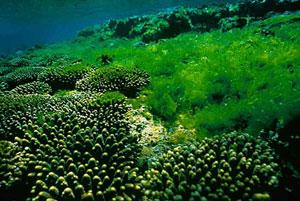 |
|
Farmers in the Netherlands believe algae could be the answer to the world's energy crisis.
|
Opinions differ on how best to grow algae and how quickly it can come on stream as a commercially viable alternative or fossil fuel supplement. But scientists and industrialists agree the potential is huge.
Carel Callenbach, Ingrepro Director, said, "Algae are very small and they grow very fast and they also need less space, and if you are dealing with biofuels, with energy, but also with nutrition, we need both energy as well as nutrition. Algae have both energy and nutrition. And that's what algae do, so if you make biofuels, get oil out of algae, than there will also be protein left over."
Algae doesn't require much space or good farmland. It can grow in fresh water, polluted water, sea water or farm runoff.
It can purify a city's sewage while feeding on the nitrogen and phosphates in human waste. And it is rich in oil.
The most common strains farmed today have an oil content of 30 percent, and it can reach more than 70 percent.
Yet, it avoids the fuel-for-food dilemma that has plagued first and second generation of biofuels like corn, sugar and palm oil.
(CCTV October 16, 2008)